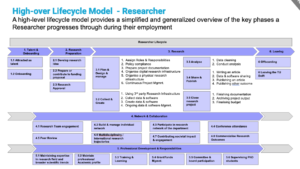(note: some links are to internal only sources)
Like all universities, TU Delft offers a wide range of support services to researchers.
This can include services for getting project funding, agreeing consortium agreements or research contracts, advice and guidance over data management, and tailor-made assistance with publishing journals or books.
And like most larger universities, these services are delivered by different organisational units in the university.
So the Impact and Innovation Centre helps with project funding, Legal Services with contracts, the faculty-based Data Stewards with data management, and the Library provides the publishing services.

Photo by Rabie Madaci on Unsplash
This apparent fragmentation can be painful for the intended target for the services, the researcher herself.
It means working with different technical systems, sometimes with not enough information, and sometimes with policies not quite aligned. Above all, it can be tricky to find the right contact, particularly for newcomers. ‘Where do I find the contract managers?’ ‘Who is my local data steward?’
If a researcher can’t find help quickly, there is a tendency to revert to generic services or information outside the university, or just to muddle through by herself.
So as part of the university Digital Strategy, we want to explore how researchers find research services. And armed with this information, we want to make it much easier for them to find these services.
This is, in a nutshell, the core of the Making Finding Research Services Easier project.
Existing channels for finding research services
We are not starting from scratch. There are already various information sources (some of these links are internal)
– TopDesk
But, as anyone who gets the access to all these links can see, the information is never complete, fully up to date. Users tend not to trust them.
The Researcher Journey
The project also elides nicely with a broader investigation. Adapting the idea of the customer journey (see the useful description from the UK government website), we want to explore the ‘researcher journey’. What are the touchpoints and pain points that each TU Delft scientist experiences as she goes through the different stages of undertaking research. Something comparable has already been done for the ‘teacher’s journey’
Mapping this journey has two stages. Firstly, is a high level concept of what has been done. Thanks to help from Merlijn Langerak and others involved in the Digital Strategy, we have a draft diagram of the different stage of this journey

We hope to follow this up with a deeper understanding of each block. How does the TU Delft researcher experience ‘Collect data and software’, or ‘Grant/funds management’
Next Steps
The Library is currently recruiting a UX Researcher to conduct interviews. From the summer onwards, S/he will start exploring the different blocks, with particular attention paid to how researchers find services within each of these blocks.
Once the initial results are collected and analysed this will lead to thinking more systematically about what is needed to a) make finding research services easier and b) more strategic interventions required to improve and quality of research services
